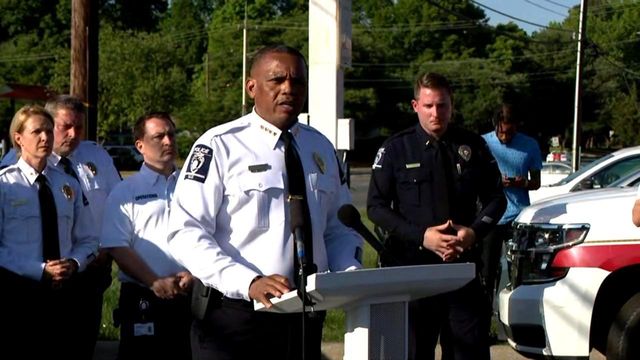Average teacher pay in NC falls short of $50,000 mark

Average teacher pay in North Carolina this school year falls short of the $50,000 mark touted by state lawmakers and former Gov. Pat McCrory last fall, according to data released this week by the Department of Public Instruction.
The actual figure is $49,837, which is hardly a huge miss at less than $200 off the mark, but critics say that gap points to deeper problems with how state and local governments pay educators.
"Teachers know better than anyone that political rhetoric in Raleigh doesn’t always match up with reality. It’s time to get serious about raising teacher pay, and I'm working with members of both parties to get it done," said Gov. Roy Cooper, a Democrat who took office on Jan. 1.
Legislative leaders say that, although the exact number is off the mark, they followed through on their promise.
"Legislative Republicans have met their goal of providing teachers an average $50,000 annual salary. The figure provided by DPI is 99.7 percent, which any statistician would round up to $50,000," said Amy Auth, a spokeswoman for Senate President Pro Tem Phil Berger.
Republican Superintendent of Public Instruction Mark Johnson, who also took office last month, said lawmakers are moving in the right direction on salaries, and he plans to keep pushing for more increases.
"Teacher pay is definitely a priority, and that’s something that was mentioned in my conversations with teachers," Johnson said. "I hope that no one makes too much of a political issue of this, just missing it by about $150. I would hate for that to be a political talking point. We’re moving in the right direction, but teachers want to be in the classroom teaching. They need to be paid what the free market is demanding."
Teacher pay has long been been both a political and a practical question for North Carolina politicians, who need to keep classrooms staffed and appease voters who consistently rank education as a top priority. Since a major push to raise average educator salaries in the 1990s, pay has eroded under the weight of inflation and more expensive benefit costs.
North Carolina has long been ranked in the bottom quartile of states when it comes to paying classroom teachers.
Over the past four years, McCrory, a Republican, and GOP allies at the General Assembly pledged to reverse the decline, first bumping minimum salaries for classroom teachers up to $35,000 and then last year setting a goal of making the average teacher salary $50,000. McCrory and Republican lawmakers campaigned on that pledge, but it was unclear throughout the fall if they had actually achieved their goal.
According to officials with the Department of Public Instruction, the $50,000 estimate by lawmakers was based on the group of teachers employed as of the 2015-16 school year. Retirements by more senior teacher meant there were fewer individuals earning the higher salaries on the pay scale, which in turn dragged down the actual figure.
Meanwhile, many teachers complained the $50,000 number doesn't reflect reality for many teachers, especially those in less wealthy school systems or those who had not amassed enough seniority to move up the pay scale.
"I think the big picture here is that the General Assembly gave a false impression that salaries would reach $50,000," said Mark Jewell, president of the North Carolina Association of Educators, the largest educator advocacy group in the state. "The majority of teachers are not even close to $50,000."
Sen. Jerry Tillman, R-Randolph, a former principal who took a lead role on education issues last session, said lawmakers had already set their sights on new salary goals for teachers.
"If it's not there, we need to get it there, and not only that, we need to get it to $55,000," Tillman said.
While state taxpayers foot the bill for the bulk of teacher salaries, what educators actually earn varies from one school system to another. In wealthier systems, such as Wake County and Chapel Hill-Carrboro, local governments provide supplements to make their systems more attractive to top teachers. Without those supplements, the average base teacher salary in the state would be $45,191.
Both lawmakers and school administrators calculate average teacher salary in line with a method laid out by the National Education Association so that North Carolina's figures can be compared to other states. Those figures are also used by the federal government, and the numbers factor in both base salary provided by the state as well as supplements provided by local governments.
The $55,000 figure Tillman cited echoes pledges from other legislative leaders. On the opening day of the legislative session, Berger staked out a promise for the coming budgets.
"We'll continue efforts to reform and improve public educations for our students and have already committed to raising average teacher pay to $55,000 over the next two years," Berger, R-Rockingham, said.
Jewell said that he appreciates the commitment to push teacher salaries even higher. He added that state leaders have also long talked about further revamping the salary schedule to provide multiple professional pathways to both stay in the classroom and earn more while taking on more responsibility.
"At least there is a commitment that we will continue to move our teacher salaries forward," he said.
Newly sworn in Superintendent of Public Instruction Mark Johnson said that he backed legislative efforts to raise teacher salary up to $55,000 and said that the state was moving in the right direction.
"I hope that no one makes too much of a political issue of this, just missing it by about $150," Johnson said. "I would hate for that to be a political talking point. We’re moving in the right direction, but teachers want to be in the classroom teaching. They need to be paid what the free market is demanding, and the General Assembly has promised to get it to $55,000, and I will help the General Assembly do that."









